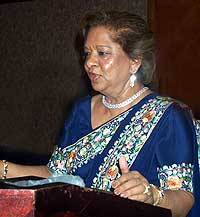 Nepali Times: What are the lessons for us in Nepal from the way African countries have handled the HIV/AIDS epidemic?
Nepali Times: What are the lessons for us in Nepal from the way African countries have handled the HIV/AIDS epidemic? Nafis Sadik: The urgent message to the countries in the region is that the time for all-out action is now while the prevalence of infection is still low and the epidemic can be controlled. South Asia is not yet anywhere near current levels of HIV/AIDS in Africa. It is still mainly confined to the most vulnerable groups-commercial sex workers, HIV drug users, men who have sex with men, transport and migrant workers-as well as people who are infected by receiving infected blood or blood products. But it is breaking out of these groups.
The lessons learned from Africa are to take the problem seriously while prevalence levels are still low. You need high-level political leadership to remove stigma and silence, to treat the problem as a development problem not just a health issue, build partnerships with NGOs religious groups and women's organisations, and to take bold actions including access to services for all who need them. South Asian countries can contain HIV/AIDS with actions now. Time is of the essence.
How seriously do you take the US administration threats to cut funds for condom propagation and use?
This is to be taken very seriously. Everyone agrees that abstinence, faithfulness must be promoted, but individuals at high risk should be enabled to protect themselves. As we know, the majority of girls and women have only one partner-90 percent of infected women got the infection from their spouse. So cutting funding for condoms for AIDS prevention will affect the health of large numbers of people including many those who may be infected as a result not of their own behaviour but that of their partners'. I hope the US, which has been a world leader on reproductive health and rights issues, will recognise these realities and maintain its support for condom programs.
There is still a lot of squeamishness about discussing sexual transmission prevention in our region. In your experience, what is the most effective way to break taboos?
This squeamishness about discussing sexual matters is one of the greatest hindrances to high-level political support. First, countries must acknowledge high risk behaviour exists in our societies. South Asian leaders need to state their objective clearly; that to contain the epidemic there must be education and information for the whole public, starting with the high risk groups. There is no cure and no preventive vaccine. The only way to stop HIV/AIDS from becoming a huge epidemic is by educating and informing people and providing access to services.
There is criticism that combating AIDS gets all the funds, leaving unglamorous diseases which kill more people under-funded. How would you respond?
The reason that HIV/AIDS is getting the attention it does is that it is not just a disease. Look at the African experience. The epidemic has reduced decades of health gains. Botswana's life expectancy which should have been about 67 years has gone down to 43 years. HIV/AIDS can be a major developmental calamity. This is why South Asian countries must act with courage and forthrightness immediately. Our leaders will be judged by the actions they take now to contain the serious problem of HIV/AIDS.
See also US gag rule hurts population and AIDS work


